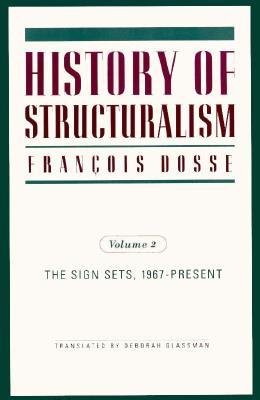François Dosse: History of Structuralism, 2 vols. (1991–) [BR-PT, EN, ES]
Filed under book | Tags: · 1940s, 1950s, 1960s, 1970s, anthropology, history, language, linguistics, literary theory, marxism, philosophy, psychoanalysis, semiotics, sociology, structuralism, unconscious


“Claude Lévi-Strauss, Roland Barthes, Jacques Lacan, Louis Althusser, Jacques Derrida, and Michel Foucault—the ideas of this group of French intellectuals who propounded structuralism and poststructuralism have had a profound impact on disciplines ranging from literary theory to sociology, from anthropology to philosophy, from history to psychoanalysis. In this long-awaited translation, History of Structuralism examines the thinkers who made up the movement, providing a fascinating elucidation of a central aspect of postwar intellectual history.
François Dosse tells the story of structuralism from its beginnings in postwar Paris, a city dominated by the towering figure of Jean-Paul Sartre. The work of Saussure became the point of departure for a group of younger scholars, and the outcome was not only the doom of Sartre as intellectual leader but the birth of a movement that would come to reconfigure French intellectual life and would eventually reverberate throughout the Western world.
Dosse provides a readable, intelligible overall account, one that shows the interrelationship among the central currents of structuralism and situates them in context. Dosse illuminates the way developments in what are usually distinct fields came to exert such influence on each other, showing how the early structuralists paved the way for later developments and for recent discourses such as postmodernism. The cast of characters related by Dosse includes those mentioned above as well as Roman Jakobson, Julia Kristeva, Pierre Bourdieu, Gilles Deleuze, Félix Guattari, Tzvetan Todorov, and many others. Chapters are devoted to major figures, and Dosse has done extensive interviews with the major and minor figures of the movement, furnishing an intellectual history in which historical players look back at the period.
This first comprehensive history of the structuralist movement is an essential guide to a major moment in the development of twentieth-century thought, one that provides a cogent map to a dizzying array of personalities and their ideas. It will be compelling reading for those interested in philosophy, literary theory, sociology, anthropology, linguistics, and psychoanalysis.”
First published in French as Histoire du structuralisme, Éditions La Découverte, Paris, 1991, 1992
English edition
Translated by Deborah Glassman
Publisher University of Minnesota Press, 1997
ISBN 0816622418, 9780816622412 & 0816623716, 9780816623716
488 & 534 pages
Publisher (EN)
História do estruturalismo I (BR-Portuguese, trans. Álvaro Cabral, 1993, added on 2024-1-20)
História do estruturalismo II (BR-Portuguese, trans. Álvaro Cabral, 1994, added on 2024-1-20)
History of Structuralism, 1: The Rising Sign, 1945-1966 (English, trans. Deborah Glassman, 1997, via falsedeity)
History of Structuralism, 2: The Sign Sets, 1967-Present (English, trans. Deborah Glassman, 1997)
Historia del estructuralismo I (Spanish, trans. María del Mar Llinares, 2004)
Historia del estructuralismo II (Spanish, trans. María del Mar Llinares, 2004)
Roland Barthes by Roland Barthes (1975/1977)
Filed under book | Tags: · biography, language, literature, semiotics

Roland Barthes by Roland Barthes is the great literary theorist’s most original work—a brilliant and playful text, gracefully combining the personal and the theoretical to reveal Roland Barthes’s tastes, his childhood, his education, his passions and regrets.
Originally published as Roland Barthes par Roland Barthes, Editions du Seuil, 1975
Translated by Richard Howard
Publisher University of California Press, with Hill and Wang, a division of Farrar, Straus & Giroux, 1977
ISBN 9780520087835
188 pages
via Keykeeper
PDF (images are of low quality)
Comment (1)Roman Jakobson: Six Lectures on Sound and Meaning (1976/1978)
Filed under book | Tags: · art, language, linguistics, meaning, semiotics, sound recording

As Lévi-Strauss writes: “These innovatory ideas, towards which I was no doubt drawn by my own thought but as yet with neither the boldness nor the conceptual tools necessary to organize them properly, were all the more convincing in that Jakobson’s exposition of them was performed with that incomparable art which made him the most dazzling teacher and lecturer that I had ever been lucky enough to hear.”
This book is marked by Jakobson’s elegance and demonstrative powers. Jakobson never pursues abstract and sometimes difficult course of his argument without illuminating it by examples from a great variety of languages and from the arts.
Originally published as Six leçons sur le son et le sens by Les Editions de Minuit, Paris, 1976.
Translated by John Mepham
Preface by Claude-Lévi Strauss
Publisher The MIT Press, 1978
ISBN 0262100193
116 pages

